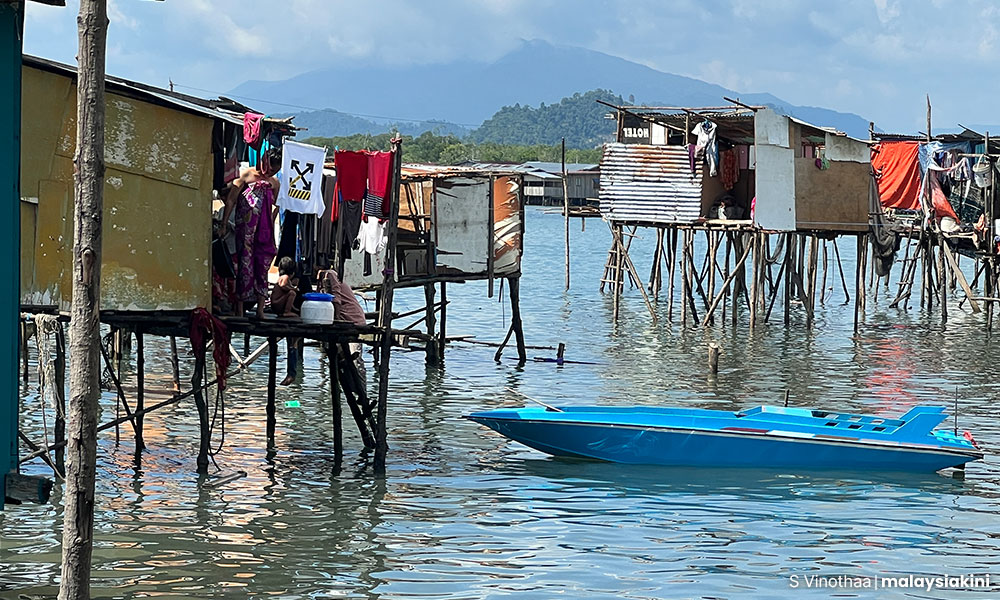Borneo: The eviction of Sea Gypsies is a violation of human rights, say NGOs
Some 500 Bajau Laut living along the coast of Sabah have been evicted, their floating homes, demolished or set on fire. A crackdown on undocumented immigrants has affected the stateless ethnic group, sparking concerns among human rights groups. For Jerald Joseph of Pusat Komas, the Sea Gypsies have faced “systematic discrimination for decades.”
Kuala Lumpur (AsiaNews) – On 4 and 5 June, the authorities demolished and set fire to the homes of more than 500 people from sea-faring communities known as Bajau Laut, or Sea Gypsies, who live along the coast of the State of Sabah, Malaysian Borneo.
Human rights activists say the eviction is part of a government crackdown on undocumented immigrants. The Bajau Laut are a stateless people who have lived in Sabah's Semporna district for generations, in wooden houseboats built on stilts in close contact with the water.
Known around the world for their diving skills and their fascinating relationship with the sea, they lack identity documents from birth, so most do not have access to basic services like education, banking, or healthcare.
They often live in fear of being detained by immigration officers or evicted for no reason. In the last three days, this fear has become a reality.
The demolished Bajau Laut homes were located on seven islands around Semporna, this according to Mukmin Nantang, founder of the Borneo Komrad NGO. The islands especially affected are Pulau Bohey Dulang, Pulau Maiga, Pulau Bodgaya, Pulau Sebangkat, and Pulau Sibuan.
“The demolition of their stilt houses on the seven islands highlights critical issues of racism, developmental injustice, and statelessness in the Borneo State of Sabah,” said another NGO, Kuala Lumpur-based Pusat Komas.
Speaking to AsiaNews, Pusat Komas director Jerald Joseph said he was deeply concerned about the recent eviction.
He explained that “The Bajau Laut, who practice a nomadic lifestyle at sea and live in small boats or wooden houses on stilts on the coast or in shallow waters, have been facing systematic discrimination for decades. Their forced removal in the last few days raises serious questions about the equitable treatment of ethnic minorities in Malaysia.”
For him, it “is imperative to ensure that all communities are respected and protected under national and international human rights laws.”
This includes Article 7 of the Universal Declaration of Human Rights (UDHR), as well as “the Federal Constitution [which] provides under Article 8 that all citizens be afforded equal protection under the law and that discrimination is prohibited based on religion, race, descent, place of birth or gender.”
One question remains unanswered: Who gave the authorities the green light to carry out such a violent destruction, that is, who should be held responsible for the eviction of the Bajau Laut.
“Sustainable development should involve comprehensive planning that considers the needs and rights of indigenous peoples,” Joseph said.
“The eviction of the Bajau Laut without adequate consultation or solutions for alternative housing exemplifies a failure to balance development with social justice,” he added.
For this reason, Pusat Komas respectfully calls on local authorities to halt further evictions and instead engage in meaningful dialogue with the Bajau Laut community to find humane and just solutions.
The issue of statelessness goes back several generations, particularly in the State of Sabah. Last year, the Human Rights Commission of Malaysia reportedly received 5,440 complaints from 2015 to 2020 with many of the investigated cases centred on citizenship issues in Sabah alone.
According to Joseph, Pusat Komas understands that this is a difficult and multifaceted issue; however, avoiding it “is not the resolution our country needs.”
State and federal governments must take the initiative and face this issue head on to prevent more generations of stateless children in Malaysia. “Moving people out of their homes only serves to move the problem elsewhere, as opposed to solving it,” Joseph added.







.png)










